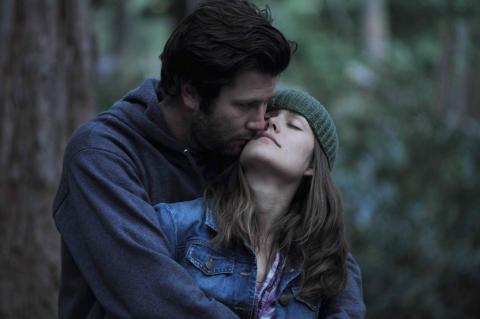 Back to selection
Back to selection
Five Questions with Leave Me Like You Found Me Director Adele Romanski

Producer Adele Romanski has built quite a filmography in a very short time. Last year, she opened David Robert Mitchell’s nostalgia-laced sleeper-hit Myth of the American Sleepover. And less than two months ago, she made a splash at Sundance with Katie Aselton’s Black Rock (which sold to LD Entertainment). Throw in a stint as a Sundance Producer’s Lab Fellow, plus several projects in development (including Mitchell’s Sleepover followup Ella Walks the Beach and Adam Bowers’ We’re A Wasteland) and it should become obvious that Romanski has been, to say the least, busy.
So when did she find time to direct her first feature? Leave Me Like You Found Me follows a recently reunited couple (played by Megan Boone and David Nordstrom) on an excursion to Sequoia National Park. As the two lovers reconnect, old tensions start to surface. Filmed on location with a small group of friends, Romanski’s film premieres today as part of SXSW’s Emerging Visions section.

Filmmaker: What inspired you to make this jump from producing to directing? Have you always wanted to direct, or was this a recent development?
Romanski: I’ve never thought of myself as a director, and I still don’t. I think of myself as a filmmaker. It sounds kind of cheesy when I say that, but I don’t know how else to label it. I produce. I edit. I direct. I could say I’m a “preditirect’? But that makes me sound like a dinosaur. I think I’ll stick with filmmaker.
As a producer, I work primarily with writer/directors so when I came up with the idea to shoot a film set in a national park, the logical next step in my mind was to sit down and write it and then ultimately direct it. Recently, a few people have asked why I didn’t get someone to direct it – which threw me. It honestly never occurred to me. It’s my story, so why would I try and get someone else to tell it?
Filmmaker: So how much of Leave Me Like You Found Me is drawn from personal experience? What inspired you to explore these themes?
Romanski: Yeah, it’s personal…I think if I tried to say it wasn’t, people would probably assume I was lying. It’s a combination of my own failed relationships and the ones I’ve seen or see around me; things I’ve felt and also assume other people feel.
I think that I went there because I felt like I knew it well enough to go there. It was comfortable, but also it was far enough in the past to go there comfortably. The relationship I’m in now is not this – thank god. It would have been difficult-to-impossible to explore these themes if they were still present in my life the way that they are for Erin and Cal.
Filmmaker: Erin and Carl are carrying a lot of baggage, especially related to one another. How did you work with Megan and David to integrate their characters’ shared history into their performances?
Romanski: We would get together and talk about the script – make decisions about who they were, how they met, how they had changed, and how they’ve grown apart – because very little of that is presented at face value in the film. There’s so much baggage and shared history there, and yet the film exists in this one week vacuum where very little backstory is revealed. It was definitely important to establish it for Meg and Dave before we went out in the woods.
Filmmaker: On your Kickstarter page you talk a lot about “destination filmmaking,” about letting a film be inspired and influenced by the environment it’s taking place within. How did you and your collaborators go about achieving this goal?
Romanski: Hmm…well, I think when the place is there at inception (as a location or backdrop for a story) then it’s always there influencing you. You don’t have to be conscious or aware of it because you can’t get away from it. For example, we filmed a scene in which one of the characters was commenting on conservation and human consumption, but we cut it out pretty early because it was overkill. When you’ve got two people standing in a meadow of giant sequoia stumps, you don’t need the added words; it’s already being communicated through the setting.
Filmmaker: Obviously, you’ve been working closely with directors for years. But were there parts of the process that surprised you once you actually got behind the camera?
Romanski: Yes! The most surprising discovery of all was the feeling of total responsibility, in a way I had never experienced. As a producer I’ve always felt I was responsible for everything, and whenever there was a problem or something went wrong, I felt like it was my fault. But once I got behind the camera as a director the feeling of responsibility was ten-fold. I remember realizing, “Wow! Now it’s really all my fault.”
I’m not trying to make it sound so negative; just that it was all on me in a way I hadn’t known… which now is a kind of cool thing to have gone through. I’m producing again, and I feel like it has given me greater empathy for my directors. And there’s still more to discover, I’m sure. I’m wondering what it’s going to feel like to stand up at a Q&A as a director…
